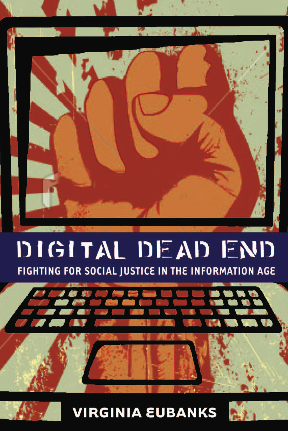 rnrnIn 2001 Virginia Eubanks and several dozen collaborators created a technology-training program for women in the YWCA of Troy-Cohoes community. This program challenged Eubanks’ conceptions of the Digital Divide, and her experience over the next four years revolutionized her thinking about access—or lack of access—to technology. rnrnIn Digital Dead End (MIT Press / March 2011 / $27.95), Eubanks argues that information technology is not a miraculous cure-all that will pave the road to prosperity, democracy and equality. Rather than being technology “have-nots,” Eubanks found that her collaborators at the YWCA had extensive interaction with IT, but they often experienced it as a tool of surveillance and oppression rather than a tool of economic and political liberation. rnrnDespite the inequities they uncovered in the high-tech global economy, optimism and innovation flourished when Eubanks and the women in the YWCA community collaborated to make technology serve social justice. Digital Dead End describes a new approach to creating a broadly inclusive and empowering “technology for people,” popular technology, which entails shifting the focus from teaching technical skill to nurturing critical technological citizenship, building resources for learning, and fostering social movement. rnrnJoin Eubanks at 6:30 PM, Tuesday, June 14 at Busboys and Poets, 2021 14th St. NW in Washington, DC, for a book signing and lively discussion of how we can build an information age that works for everyone!rnrnThis event is generously co-sponsored by Teaching for Change, DC Jobs with Justice, and the Institute for Women’s Policy Research.rn
rnrnIn 2001 Virginia Eubanks and several dozen collaborators created a technology-training program for women in the YWCA of Troy-Cohoes community. This program challenged Eubanks’ conceptions of the Digital Divide, and her experience over the next four years revolutionized her thinking about access—or lack of access—to technology. rnrnIn Digital Dead End (MIT Press / March 2011 / $27.95), Eubanks argues that information technology is not a miraculous cure-all that will pave the road to prosperity, democracy and equality. Rather than being technology “have-nots,” Eubanks found that her collaborators at the YWCA had extensive interaction with IT, but they often experienced it as a tool of surveillance and oppression rather than a tool of economic and political liberation. rnrnDespite the inequities they uncovered in the high-tech global economy, optimism and innovation flourished when Eubanks and the women in the YWCA community collaborated to make technology serve social justice. Digital Dead End describes a new approach to creating a broadly inclusive and empowering “technology for people,” popular technology, which entails shifting the focus from teaching technical skill to nurturing critical technological citizenship, building resources for learning, and fostering social movement. rnrnJoin Eubanks at 6:30 PM, Tuesday, June 14 at Busboys and Poets, 2021 14th St. NW in Washington, DC, for a book signing and lively discussion of how we can build an information age that works for everyone!rnrnThis event is generously co-sponsored by Teaching for Change, DC Jobs with Justice, and the Institute for Women’s Policy Research.rn
